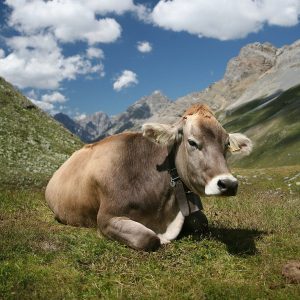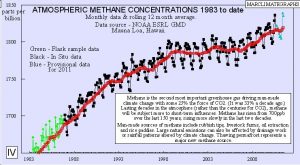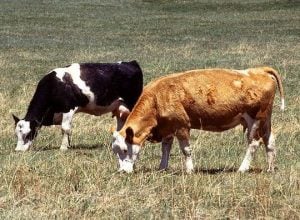Cows are really cute. They just stand there in the grass, four-legged and everything, eating their grass, mooing, and just living life like cows should. They taste good, and they make milk, which means that we (humans, if you needed that clarification) love to farm them. As a result, there’s a LOT of them (more than 1.5 billion) all over the planet. Seems like a good thing right? I mean, how could too much of this be a bad thing?
Unfortunately, cows have a dark side. Cattle are a type of animal called a ruminant, which have specialized stomach to digest plant material by storing it and fermenting it. Once fermented, the food, known as cud, must be chewed again before digestion is complete. In the cow’s stomach aiding it in this process are tiny microbes known as methanogens. These guys allow cows to digest things like cellulose (plant matter), but produce methane as a waste products. Cows then either burp or fart out this gas.
With all the cows on the planet, the methane being emitted has become a major problem. Methane is a greenhouse gas 25 times more powerful than carbon dioxide, meaning it warms the planet at a much higher rate. Livestock account for 14.5% of all anthropomorphic (human) greenhouse gas emissions, and cattle account for 65% of all livestock emissions. So obviously, cows’ farts and burps are a problem. So how can we fix it?
The three issues, according to microbiologist Lorenzo Morelli, are diet, genetics, and the microbiology of cows. Phil Garnsworthy of Ruminomics, an organization with a goal of reducing cows’ emissions, looks to selection to help lessen the problem. According to him, cattle vary by a factor of two to three on the amount of methane given off. By simply favoring and only breeding those cattle that only emit low amounts of methane, the problem can be immediately mitigated. Dairy Farmers have an extra incentive to reduce methane by breeding low methane cows separate from the environment, as well. The methane represents lost energy that could go into producing more milk, and so adding low-methane to a list of attractive cow characteristics would not only help the environment, but also farmers’ wallets. But plain ol’ artificial selection isn’t the only option.
Changing cows’ diet may also help reduce the problem. Scientists at Aarhus University are looking into producing a genetically-engineered grass to give to cows. By changing and running tests on the DNA of the grass and eventually finding the optimal type, the scientists hope to make grass less stiff and easier to digest for the cows, which would not only decrease methane production due to less activity from the microbes, but also increase milk production.
There is an also an option of dealing directly with the microbes themselves and their methane release. For example, Researches at Penn State are studying the effects of 3-nitrooxypropanol (3NOP) on cows’ methane emissions. 3NOP, when put into cow feed, would in theory stop the microbes from producing methane when it binds to the cows’ digestive tracts. Cattle saw a 30% reduction of methane when fed 3NOP.
And finally, there is always the prospect of genetically modifying cows themselves to produce less methane. The tricky part about this is that it’s the microbes that actually produce the methane, not the cows. Morelli says, “We think that animal genetics may well influence their gut microbiology. However, this link has not been proved and we are still in the data collection phase.” Essentially, though we might be far from a GMO cow that produces less methane, it is not outside the realm of possibility. Even now, the Genome Canada project is looking into the genes responsible for lower methane emissions, with the hope of spreading the gene to other populations of cows.
Personally, I believe scientists should be doing whatever they can to reduce methane emissions. This is our planet, and we need to do everything we can to save it. This includes GMO research, which I realize makes some people uneasy, but in my opinion is a great, new way to help our planet and help ourselves. However, any solution that would hurt cows, reduce lifespan, or ruin milk or beef taste should only be used as a last resort. Even then, I would be hesitant to implement such changes. Essentially, what route is the most efficient and practical, and what are you willing to sacrifice? These are the two questions that must be answered in finding a way to reducing cows’ methane emissions.
All in all, it seems cows are on their way to being lesser burdens on our environment. And that’s a great thing, because then I would be able to appreciate their cuteness more without feeling a bit of guilt.





chromison
Interesting article EKAULI, this is one of the many pressing and important environmental issues of our time. I think that changing the cows diet is definitely the most effective way to combat this issue but I think applying this to small farms all around the country, and even the world, would prove to be extremely difficult. Nevertheless, it is a glaring problem and an issue we need to address as a global community, The following is a study from Penn State that gives some methane production statistics along with an in depth look at the dietary changes needed to help solve this problem.
https://extension.psu.edu/carbon-methane-emissions-and-the-dairy-cow
celliswallier
Hey Ekauli,
I found a very recent article that you may find interesting. It talks about Fetal Programming, which involves having pregnant cows go through a “starving phase.” This “starving phase” not only causes the mother to become more efficient in using food for vital life functions, but the cow’s baby also has been found to become more efficient in the same way! This is very interesting, both from a methane control standpoint and from an ethics viewpoint. I recommend you read this article.
https://www.thegatewayonline.ca/2017/11/u-of-a-cattle-research-ranch/